Legal Philosophy: A Comparison of Wallace and King's Political Views
VerifiedAdded on 2022/11/29
|7
|1897
|52
Essay
AI Summary
This essay delves into the contrasting legal philosophies of George Wallace and Martin Luther King Jr., two prominent figures with opposing views on racial segregation and civil rights in America. The essay begins by examining their differing perspectives on the legitimacy of positive law versus natural law, with Wallace favoring positive law to enforce segregation and King advocating for natural law to promote civil rights. It then explores their contrasting views on the duty to obey the law, the use of law to promote the common good, and the application of the harm to others principle. The essay further analyzes their stances on the role of morality in shaping the aims of law, highlighting how Wallace viewed law as a tool for white supremacist agendas while King emphasized the importance of morality in ensuring justice and equality. Through these comparisons, the essay provides a comprehensive understanding of the legal and philosophical frameworks that underpinned the contrasting ideologies of Wallace and King, revealing their profound impact on American society.
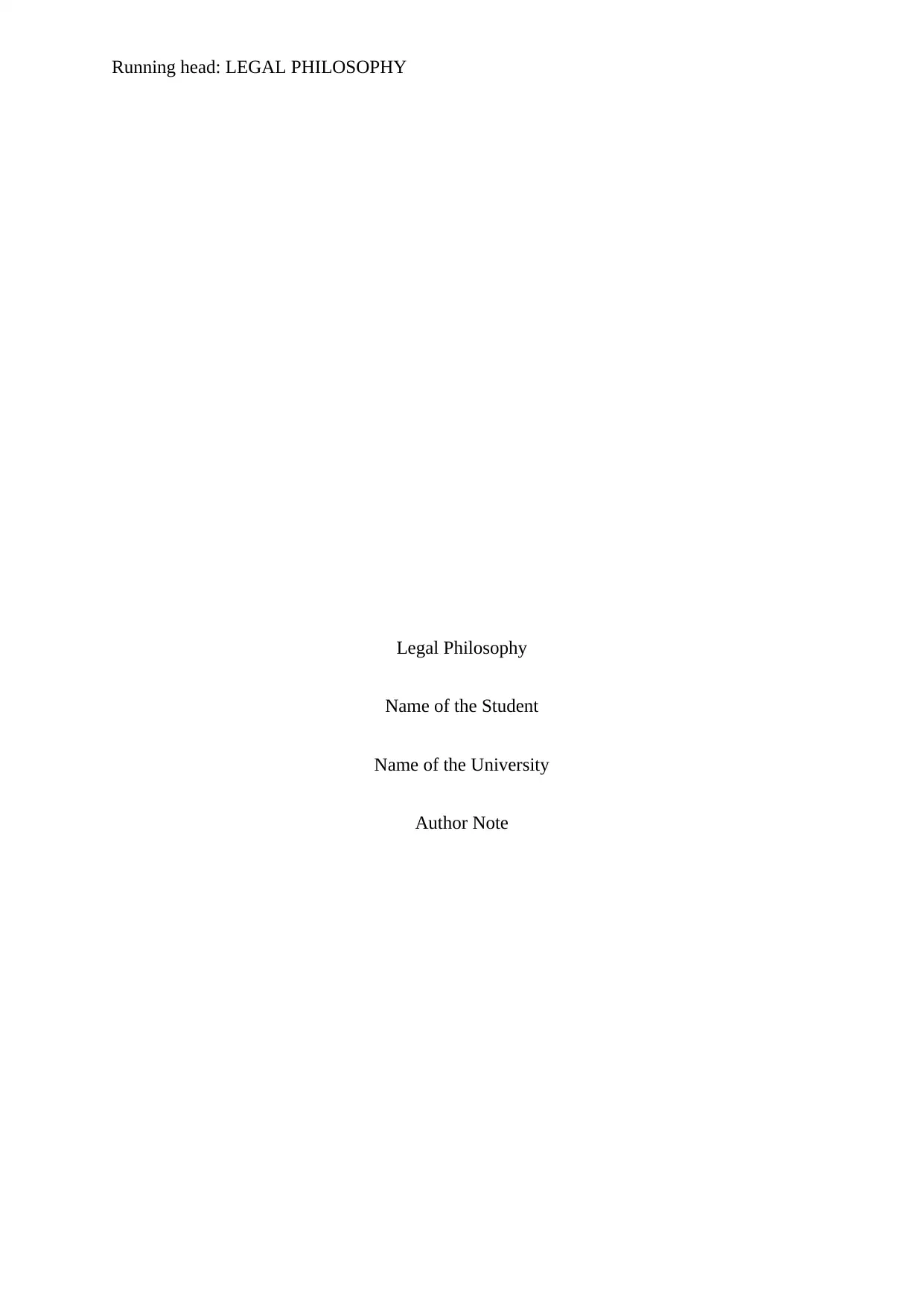
Running head: LEGAL PHILOSOPHY
Legal Philosophy
Name of the Student
Name of the University
Author Note
Legal Philosophy
Name of the Student
Name of the University
Author Note
Paraphrase This Document
Need a fresh take? Get an instant paraphrase of this document with our AI Paraphraser
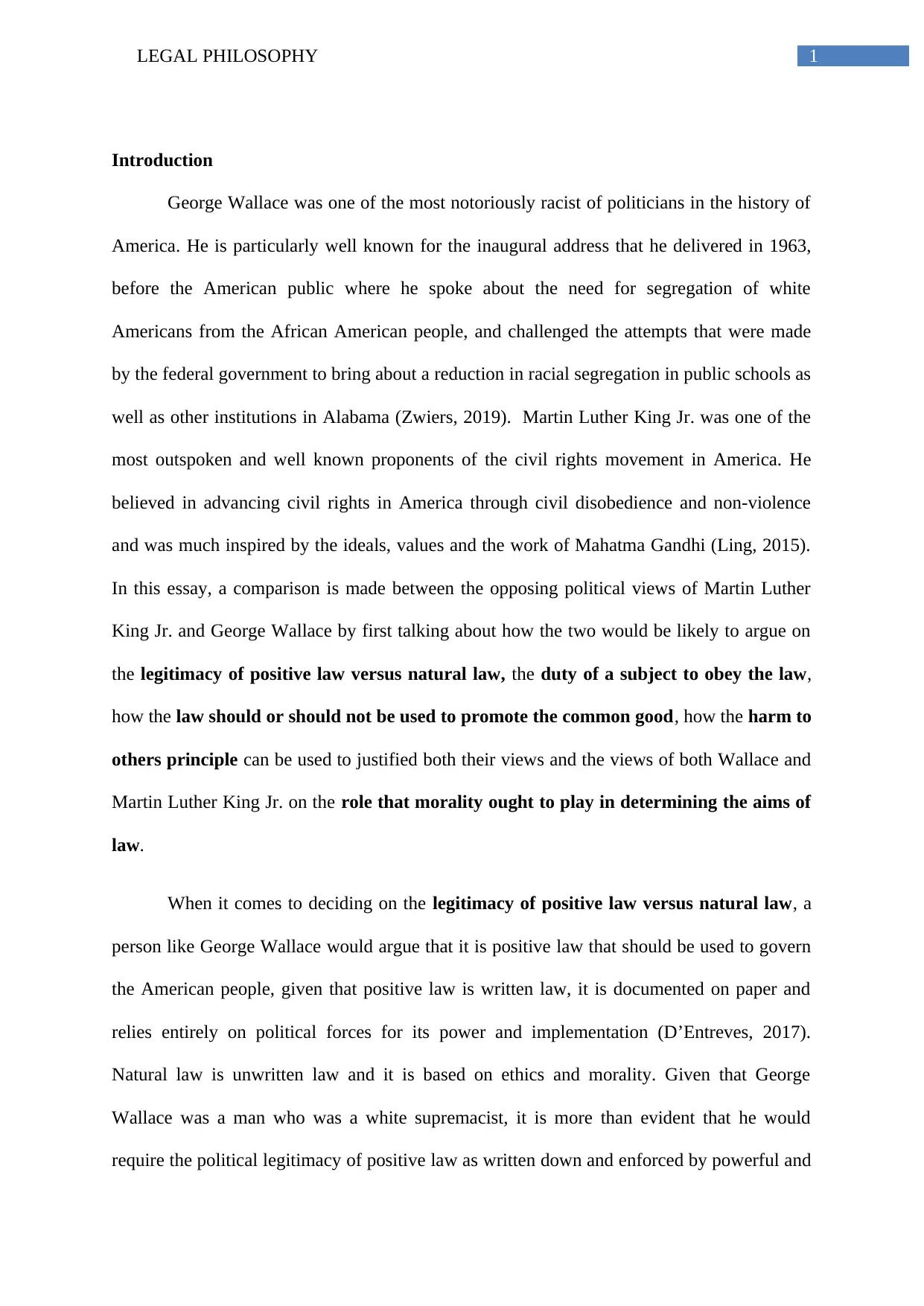
1LEGAL PHILOSOPHY
Introduction
George Wallace was one of the most notoriously racist of politicians in the history of
America. He is particularly well known for the inaugural address that he delivered in 1963,
before the American public where he spoke about the need for segregation of white
Americans from the African American people, and challenged the attempts that were made
by the federal government to bring about a reduction in racial segregation in public schools as
well as other institutions in Alabama (Zwiers, 2019). Martin Luther King Jr. was one of the
most outspoken and well known proponents of the civil rights movement in America. He
believed in advancing civil rights in America through civil disobedience and non-violence
and was much inspired by the ideals, values and the work of Mahatma Gandhi (Ling, 2015).
In this essay, a comparison is made between the opposing political views of Martin Luther
King Jr. and George Wallace by first talking about how the two would be likely to argue on
the legitimacy of positive law versus natural law, the duty of a subject to obey the law,
how the law should or should not be used to promote the common good, how the harm to
others principle can be used to justified both their views and the views of both Wallace and
Martin Luther King Jr. on the role that morality ought to play in determining the aims of
law.
When it comes to deciding on the legitimacy of positive law versus natural law, a
person like George Wallace would argue that it is positive law that should be used to govern
the American people, given that positive law is written law, it is documented on paper and
relies entirely on political forces for its power and implementation (D’Entreves, 2017).
Natural law is unwritten law and it is based on ethics and morality. Given that George
Wallace was a man who was a white supremacist, it is more than evident that he would
require the political legitimacy of positive law as written down and enforced by powerful and
Introduction
George Wallace was one of the most notoriously racist of politicians in the history of
America. He is particularly well known for the inaugural address that he delivered in 1963,
before the American public where he spoke about the need for segregation of white
Americans from the African American people, and challenged the attempts that were made
by the federal government to bring about a reduction in racial segregation in public schools as
well as other institutions in Alabama (Zwiers, 2019). Martin Luther King Jr. was one of the
most outspoken and well known proponents of the civil rights movement in America. He
believed in advancing civil rights in America through civil disobedience and non-violence
and was much inspired by the ideals, values and the work of Mahatma Gandhi (Ling, 2015).
In this essay, a comparison is made between the opposing political views of Martin Luther
King Jr. and George Wallace by first talking about how the two would be likely to argue on
the legitimacy of positive law versus natural law, the duty of a subject to obey the law,
how the law should or should not be used to promote the common good, how the harm to
others principle can be used to justified both their views and the views of both Wallace and
Martin Luther King Jr. on the role that morality ought to play in determining the aims of
law.
When it comes to deciding on the legitimacy of positive law versus natural law, a
person like George Wallace would argue that it is positive law that should be used to govern
the American people, given that positive law is written law, it is documented on paper and
relies entirely on political forces for its power and implementation (D’Entreves, 2017).
Natural law is unwritten law and it is based on ethics and morality. Given that George
Wallace was a man who was a white supremacist, it is more than evident that he would
require the political legitimacy of positive law as written down and enforced by powerful and
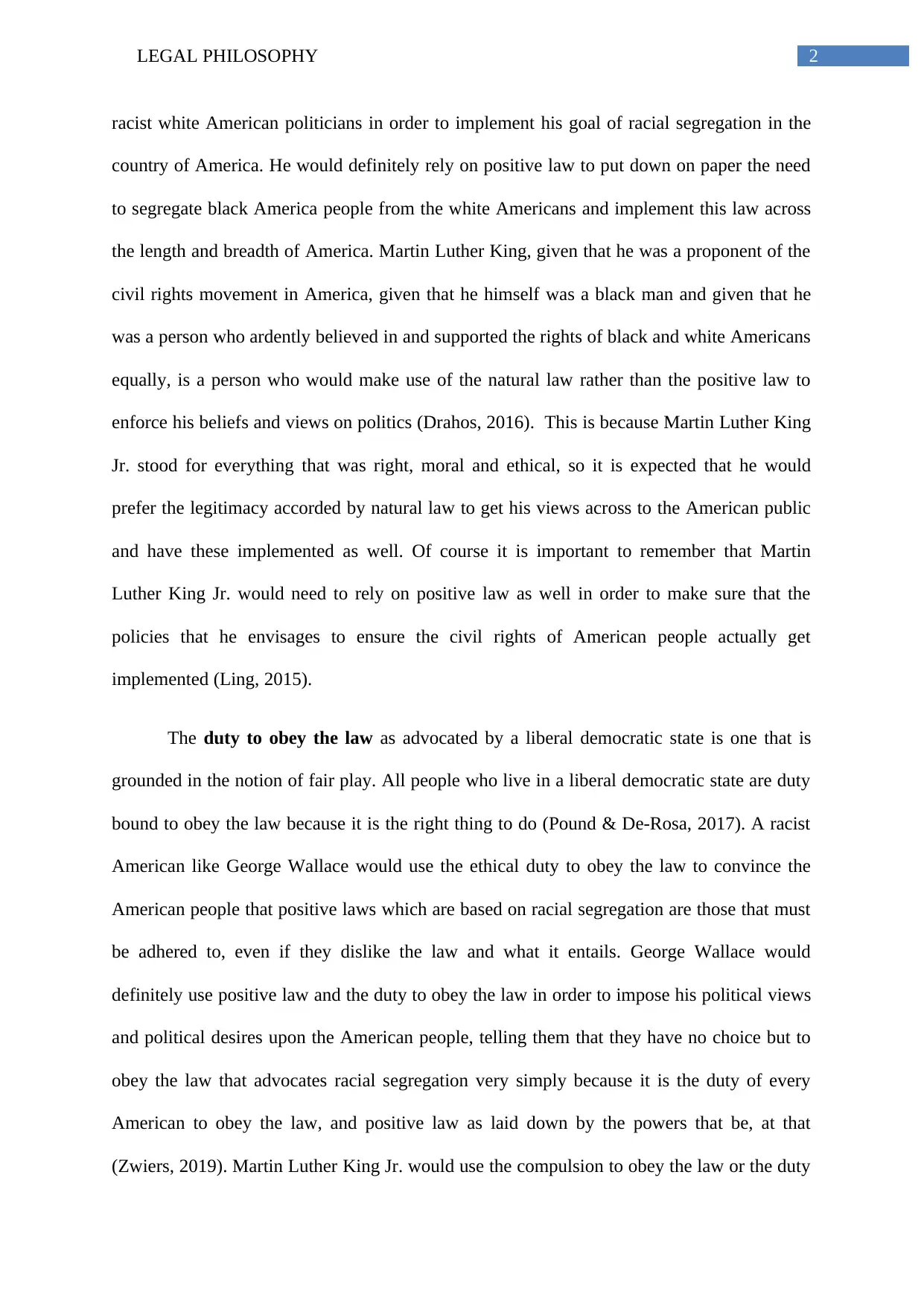
2LEGAL PHILOSOPHY
racist white American politicians in order to implement his goal of racial segregation in the
country of America. He would definitely rely on positive law to put down on paper the need
to segregate black America people from the white Americans and implement this law across
the length and breadth of America. Martin Luther King, given that he was a proponent of the
civil rights movement in America, given that he himself was a black man and given that he
was a person who ardently believed in and supported the rights of black and white Americans
equally, is a person who would make use of the natural law rather than the positive law to
enforce his beliefs and views on politics (Drahos, 2016). This is because Martin Luther King
Jr. stood for everything that was right, moral and ethical, so it is expected that he would
prefer the legitimacy accorded by natural law to get his views across to the American public
and have these implemented as well. Of course it is important to remember that Martin
Luther King Jr. would need to rely on positive law as well in order to make sure that the
policies that he envisages to ensure the civil rights of American people actually get
implemented (Ling, 2015).
The duty to obey the law as advocated by a liberal democratic state is one that is
grounded in the notion of fair play. All people who live in a liberal democratic state are duty
bound to obey the law because it is the right thing to do (Pound & De-Rosa, 2017). A racist
American like George Wallace would use the ethical duty to obey the law to convince the
American people that positive laws which are based on racial segregation are those that must
be adhered to, even if they dislike the law and what it entails. George Wallace would
definitely use positive law and the duty to obey the law in order to impose his political views
and political desires upon the American people, telling them that they have no choice but to
obey the law that advocates racial segregation very simply because it is the duty of every
American to obey the law, and positive law as laid down by the powers that be, at that
(Zwiers, 2019). Martin Luther King Jr. would use the compulsion to obey the law or the duty
racist white American politicians in order to implement his goal of racial segregation in the
country of America. He would definitely rely on positive law to put down on paper the need
to segregate black America people from the white Americans and implement this law across
the length and breadth of America. Martin Luther King, given that he was a proponent of the
civil rights movement in America, given that he himself was a black man and given that he
was a person who ardently believed in and supported the rights of black and white Americans
equally, is a person who would make use of the natural law rather than the positive law to
enforce his beliefs and views on politics (Drahos, 2016). This is because Martin Luther King
Jr. stood for everything that was right, moral and ethical, so it is expected that he would
prefer the legitimacy accorded by natural law to get his views across to the American public
and have these implemented as well. Of course it is important to remember that Martin
Luther King Jr. would need to rely on positive law as well in order to make sure that the
policies that he envisages to ensure the civil rights of American people actually get
implemented (Ling, 2015).
The duty to obey the law as advocated by a liberal democratic state is one that is
grounded in the notion of fair play. All people who live in a liberal democratic state are duty
bound to obey the law because it is the right thing to do (Pound & De-Rosa, 2017). A racist
American like George Wallace would use the ethical duty to obey the law to convince the
American people that positive laws which are based on racial segregation are those that must
be adhered to, even if they dislike the law and what it entails. George Wallace would
definitely use positive law and the duty to obey the law in order to impose his political views
and political desires upon the American people, telling them that they have no choice but to
obey the law that advocates racial segregation very simply because it is the duty of every
American to obey the law, and positive law as laid down by the powers that be, at that
(Zwiers, 2019). Martin Luther King Jr. would use the compulsion to obey the law or the duty
⊘ This is a preview!⊘
Do you want full access?
Subscribe today to unlock all pages.

Trusted by 1+ million students worldwide
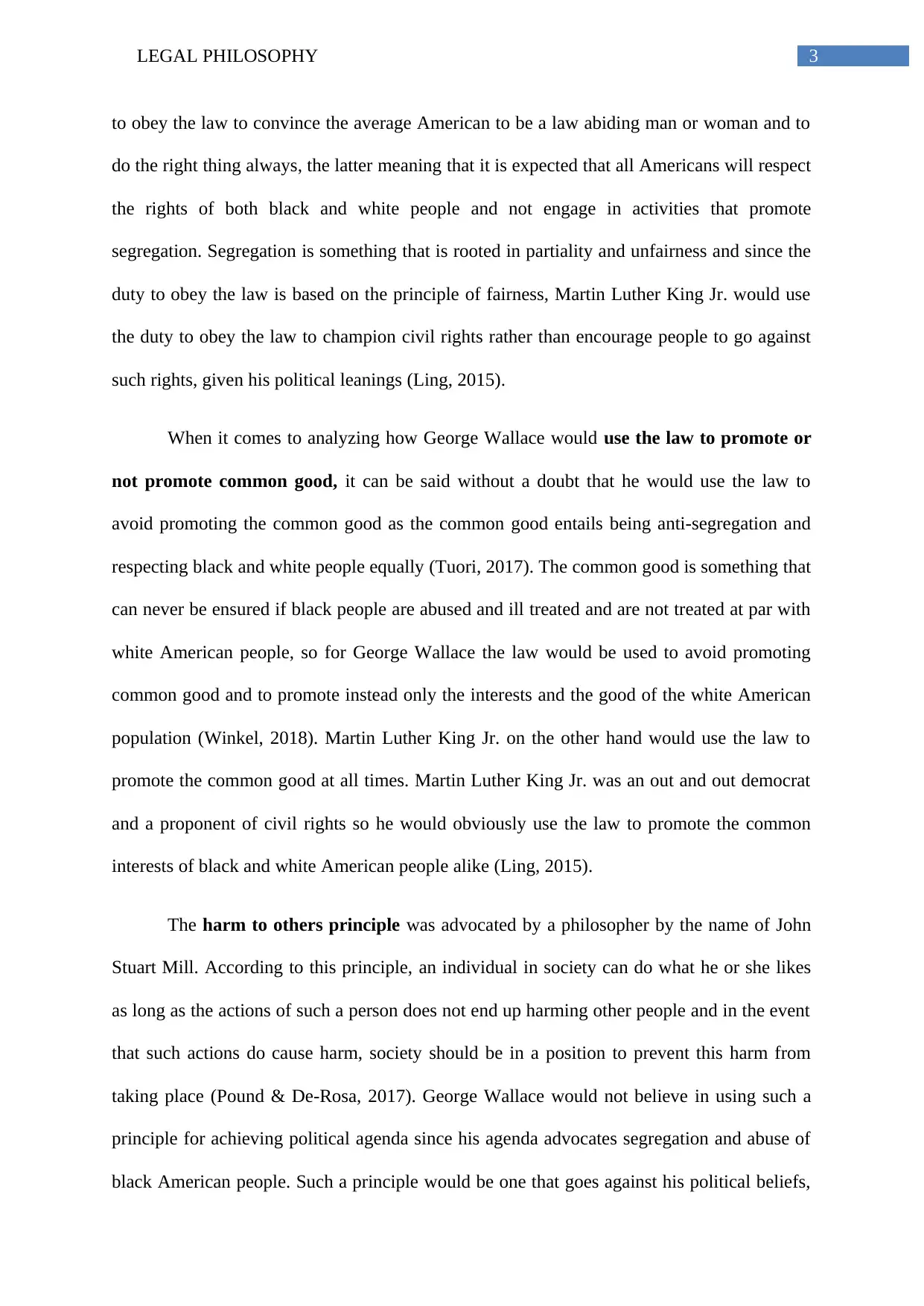
3LEGAL PHILOSOPHY
to obey the law to convince the average American to be a law abiding man or woman and to
do the right thing always, the latter meaning that it is expected that all Americans will respect
the rights of both black and white people and not engage in activities that promote
segregation. Segregation is something that is rooted in partiality and unfairness and since the
duty to obey the law is based on the principle of fairness, Martin Luther King Jr. would use
the duty to obey the law to champion civil rights rather than encourage people to go against
such rights, given his political leanings (Ling, 2015).
When it comes to analyzing how George Wallace would use the law to promote or
not promote common good, it can be said without a doubt that he would use the law to
avoid promoting the common good as the common good entails being anti-segregation and
respecting black and white people equally (Tuori, 2017). The common good is something that
can never be ensured if black people are abused and ill treated and are not treated at par with
white American people, so for George Wallace the law would be used to avoid promoting
common good and to promote instead only the interests and the good of the white American
population (Winkel, 2018). Martin Luther King Jr. on the other hand would use the law to
promote the common good at all times. Martin Luther King Jr. was an out and out democrat
and a proponent of civil rights so he would obviously use the law to promote the common
interests of black and white American people alike (Ling, 2015).
The harm to others principle was advocated by a philosopher by the name of John
Stuart Mill. According to this principle, an individual in society can do what he or she likes
as long as the actions of such a person does not end up harming other people and in the event
that such actions do cause harm, society should be in a position to prevent this harm from
taking place (Pound & De-Rosa, 2017). George Wallace would not believe in using such a
principle for achieving political agenda since his agenda advocates segregation and abuse of
black American people. Such a principle would be one that goes against his political beliefs,
to obey the law to convince the average American to be a law abiding man or woman and to
do the right thing always, the latter meaning that it is expected that all Americans will respect
the rights of both black and white people and not engage in activities that promote
segregation. Segregation is something that is rooted in partiality and unfairness and since the
duty to obey the law is based on the principle of fairness, Martin Luther King Jr. would use
the duty to obey the law to champion civil rights rather than encourage people to go against
such rights, given his political leanings (Ling, 2015).
When it comes to analyzing how George Wallace would use the law to promote or
not promote common good, it can be said without a doubt that he would use the law to
avoid promoting the common good as the common good entails being anti-segregation and
respecting black and white people equally (Tuori, 2017). The common good is something that
can never be ensured if black people are abused and ill treated and are not treated at par with
white American people, so for George Wallace the law would be used to avoid promoting
common good and to promote instead only the interests and the good of the white American
population (Winkel, 2018). Martin Luther King Jr. on the other hand would use the law to
promote the common good at all times. Martin Luther King Jr. was an out and out democrat
and a proponent of civil rights so he would obviously use the law to promote the common
interests of black and white American people alike (Ling, 2015).
The harm to others principle was advocated by a philosopher by the name of John
Stuart Mill. According to this principle, an individual in society can do what he or she likes
as long as the actions of such a person does not end up harming other people and in the event
that such actions do cause harm, society should be in a position to prevent this harm from
taking place (Pound & De-Rosa, 2017). George Wallace would not believe in using such a
principle for achieving political agenda since his agenda advocates segregation and abuse of
black American people. Such a principle would be one that goes against his political beliefs,
Paraphrase This Document
Need a fresh take? Get an instant paraphrase of this document with our AI Paraphraser
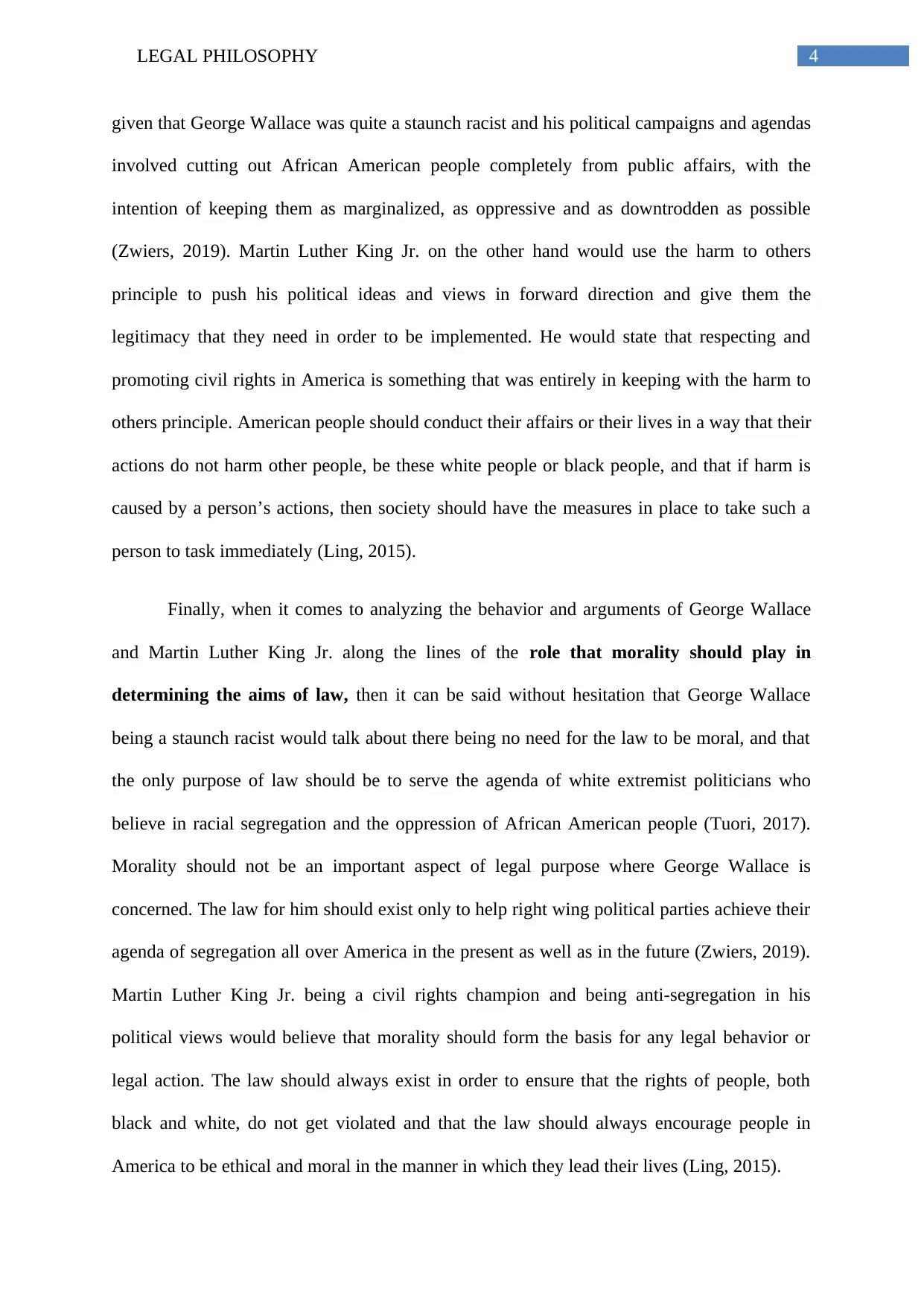
4LEGAL PHILOSOPHY
given that George Wallace was quite a staunch racist and his political campaigns and agendas
involved cutting out African American people completely from public affairs, with the
intention of keeping them as marginalized, as oppressive and as downtrodden as possible
(Zwiers, 2019). Martin Luther King Jr. on the other hand would use the harm to others
principle to push his political ideas and views in forward direction and give them the
legitimacy that they need in order to be implemented. He would state that respecting and
promoting civil rights in America is something that was entirely in keeping with the harm to
others principle. American people should conduct their affairs or their lives in a way that their
actions do not harm other people, be these white people or black people, and that if harm is
caused by a person’s actions, then society should have the measures in place to take such a
person to task immediately (Ling, 2015).
Finally, when it comes to analyzing the behavior and arguments of George Wallace
and Martin Luther King Jr. along the lines of the role that morality should play in
determining the aims of law, then it can be said without hesitation that George Wallace
being a staunch racist would talk about there being no need for the law to be moral, and that
the only purpose of law should be to serve the agenda of white extremist politicians who
believe in racial segregation and the oppression of African American people (Tuori, 2017).
Morality should not be an important aspect of legal purpose where George Wallace is
concerned. The law for him should exist only to help right wing political parties achieve their
agenda of segregation all over America in the present as well as in the future (Zwiers, 2019).
Martin Luther King Jr. being a civil rights champion and being anti-segregation in his
political views would believe that morality should form the basis for any legal behavior or
legal action. The law should always exist in order to ensure that the rights of people, both
black and white, do not get violated and that the law should always encourage people in
America to be ethical and moral in the manner in which they lead their lives (Ling, 2015).
given that George Wallace was quite a staunch racist and his political campaigns and agendas
involved cutting out African American people completely from public affairs, with the
intention of keeping them as marginalized, as oppressive and as downtrodden as possible
(Zwiers, 2019). Martin Luther King Jr. on the other hand would use the harm to others
principle to push his political ideas and views in forward direction and give them the
legitimacy that they need in order to be implemented. He would state that respecting and
promoting civil rights in America is something that was entirely in keeping with the harm to
others principle. American people should conduct their affairs or their lives in a way that their
actions do not harm other people, be these white people or black people, and that if harm is
caused by a person’s actions, then society should have the measures in place to take such a
person to task immediately (Ling, 2015).
Finally, when it comes to analyzing the behavior and arguments of George Wallace
and Martin Luther King Jr. along the lines of the role that morality should play in
determining the aims of law, then it can be said without hesitation that George Wallace
being a staunch racist would talk about there being no need for the law to be moral, and that
the only purpose of law should be to serve the agenda of white extremist politicians who
believe in racial segregation and the oppression of African American people (Tuori, 2017).
Morality should not be an important aspect of legal purpose where George Wallace is
concerned. The law for him should exist only to help right wing political parties achieve their
agenda of segregation all over America in the present as well as in the future (Zwiers, 2019).
Martin Luther King Jr. being a civil rights champion and being anti-segregation in his
political views would believe that morality should form the basis for any legal behavior or
legal action. The law should always exist in order to ensure that the rights of people, both
black and white, do not get violated and that the law should always encourage people in
America to be ethical and moral in the manner in which they lead their lives (Ling, 2015).
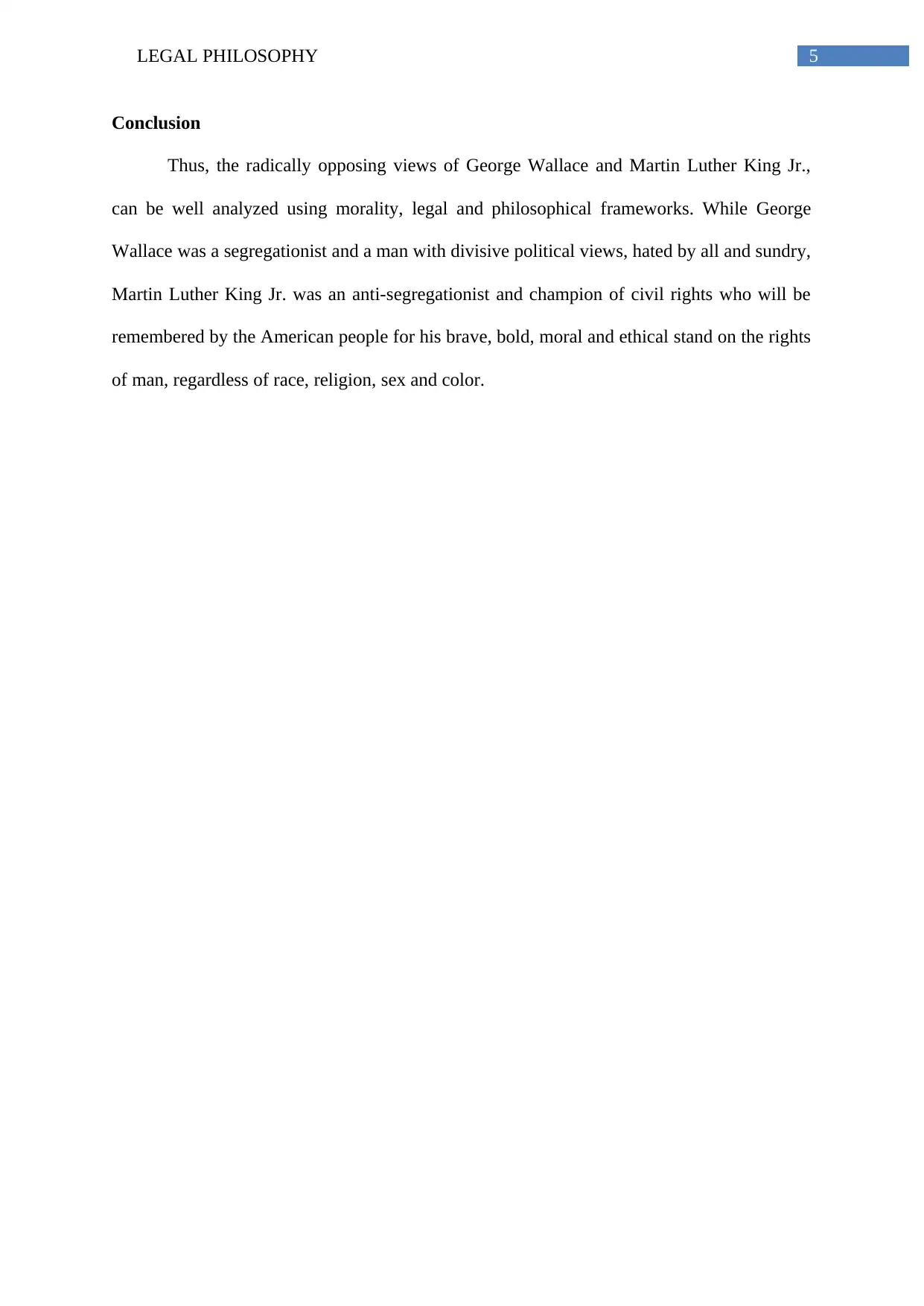
5LEGAL PHILOSOPHY
Conclusion
Thus, the radically opposing views of George Wallace and Martin Luther King Jr.,
can be well analyzed using morality, legal and philosophical frameworks. While George
Wallace was a segregationist and a man with divisive political views, hated by all and sundry,
Martin Luther King Jr. was an anti-segregationist and champion of civil rights who will be
remembered by the American people for his brave, bold, moral and ethical stand on the rights
of man, regardless of race, religion, sex and color.
Conclusion
Thus, the radically opposing views of George Wallace and Martin Luther King Jr.,
can be well analyzed using morality, legal and philosophical frameworks. While George
Wallace was a segregationist and a man with divisive political views, hated by all and sundry,
Martin Luther King Jr. was an anti-segregationist and champion of civil rights who will be
remembered by the American people for his brave, bold, moral and ethical stand on the rights
of man, regardless of race, religion, sex and color.
⊘ This is a preview!⊘
Do you want full access?
Subscribe today to unlock all pages.

Trusted by 1+ million students worldwide
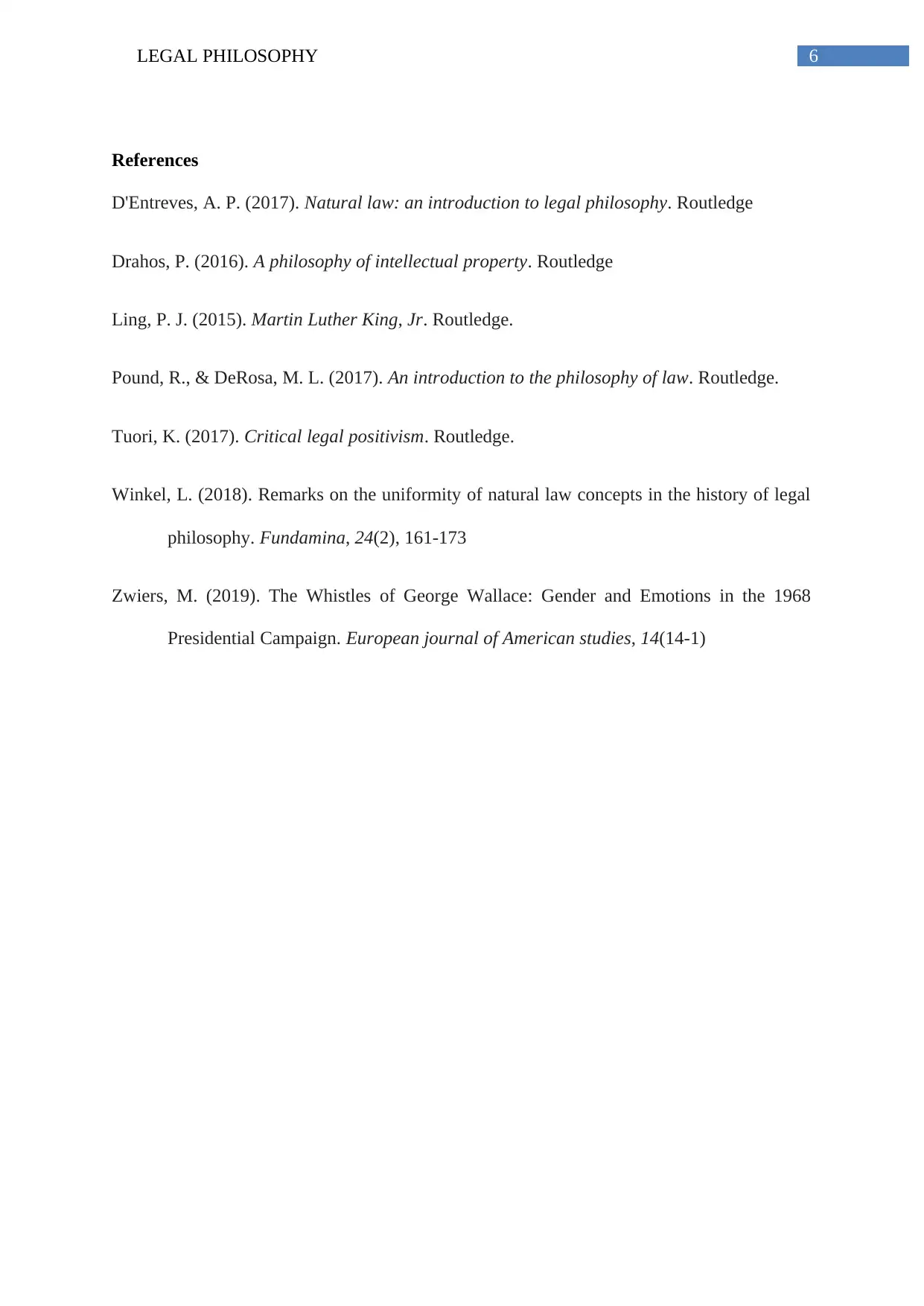
6LEGAL PHILOSOPHY
References
D'Entreves, A. P. (2017). Natural law: an introduction to legal philosophy. Routledge
Drahos, P. (2016). A philosophy of intellectual property. Routledge
Ling, P. J. (2015). Martin Luther King, Jr. Routledge.
Pound, R., & DeRosa, M. L. (2017). An introduction to the philosophy of law. Routledge.
Tuori, K. (2017). Critical legal positivism. Routledge.
Winkel, L. (2018). Remarks on the uniformity of natural law concepts in the history of legal
philosophy. Fundamina, 24(2), 161-173
Zwiers, M. (2019). The Whistles of George Wallace: Gender and Emotions in the 1968
Presidential Campaign. European journal of American studies, 14(14-1)
References
D'Entreves, A. P. (2017). Natural law: an introduction to legal philosophy. Routledge
Drahos, P. (2016). A philosophy of intellectual property. Routledge
Ling, P. J. (2015). Martin Luther King, Jr. Routledge.
Pound, R., & DeRosa, M. L. (2017). An introduction to the philosophy of law. Routledge.
Tuori, K. (2017). Critical legal positivism. Routledge.
Winkel, L. (2018). Remarks on the uniformity of natural law concepts in the history of legal
philosophy. Fundamina, 24(2), 161-173
Zwiers, M. (2019). The Whistles of George Wallace: Gender and Emotions in the 1968
Presidential Campaign. European journal of American studies, 14(14-1)
1 out of 7
Related Documents
Your All-in-One AI-Powered Toolkit for Academic Success.
+13062052269
info@desklib.com
Available 24*7 on WhatsApp / Email
![[object Object]](/_next/static/media/star-bottom.7253800d.svg)
Unlock your academic potential
Copyright © 2020–2026 A2Z Services. All Rights Reserved. Developed and managed by ZUCOL.





